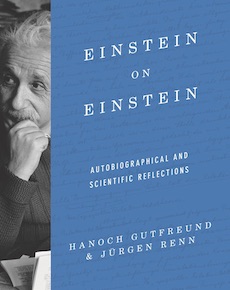By Jay M. Pasachoff
Albert Einstein is known not only for his theories of relativity but also for his humanitarian good works. In spite of my having read many books by and about Einstein, I had not known that he had been invited to contribute to The Library of Living Philosophers, volume seven (1949) in the series arranged by Paul Schilpp, of whom I had not heard; Einstein was the only scientist included.
The greatest of 2020’s Einstein historians/interpreters, Hanoch Gutfreund and Jürgen Renn have put together Einstein’s musings with various essays interpreting his views, showing also the original documents from 1946.
Einstein’s volume was written soon after the end of World War II. He wrote, in favor of world government: “The weapons of modern warfare have developed to such a degree that, in another world war, the victor would probably suffer not much less than the vanquished.”
Gutfreund, a theoretical physicist, is a past president of the Hebrew University of Jerusalem, one of two sites (with Caltech) at which Einstein’s archives are housed. Renn is at the Max Planck Institute for the History of Science in Berlin. They have reproduced extensive original writings of Einstein and put them in context.
A well-chosen set of photographs, plus some new, original drawings (though unfortunately not printed in color), help make the book very readable. Occasional images of Einstein’s original handwriting are reproduced, showing his crossing-out and editing of his script (with the deleted paragraph translated, for example).
We can read, for instance, Einstein’s note from the philosophical book, in a chapter about Max Planck’s formula for black-body radiation, which was integral to Einstein’s eventual Nobel Prize (his relativity work was considered too controversial; elsewhere, we see a photograph of Einstein and Planck together): “All my attempts, however, to adapt the theoretical foundation of physics to this [new type of] knowledge failed completely. It was as if the ground had been pulled out from under one, with no firm foundation to be seen anywhere upon which one could have built.”
In a chapter on the general theory of relativity, Einstein is quoted: “The acceleration of a system falling freely in a given gravitational field is independent of the nature of the falling system . . . . This simple state of affairs could not at all, or at any rate not in any natural fashion, be represented in a satisfactory way. This convinced me that, within the structure of the special theory of relativity, there is no niche for a satisfactory theory of gravitation.”
A final part of the book reproduces in English translation (aside from a facsimile handwritten page in German from “The Foundation of General Relativity”) the text of an autobiographical sketch from 1955. This was Einstein’s last essay; he died two weeks after submitting it.
How can one resist the opportunity to read, in English translation, at this time when so many students are deciding whether to take gap years: “In 1895, aged sixteen, I arrived in Zurich from Italy after spending a year at my parents’ home in Milan without attending school or having any tuition at all. My goal was admission to the Polytechnic, but I had no clear idea for achieving it.”
And, in conclusion: “Here I sit in order to write, at the age of sixty-seven, something like my own obituary.”
The opportunity to read Einstein’s musings, interpreted by two current leaders in Einstein studies, is valuable to all interested in the history or philosophy of physics as well as in Einstein himself.
Astronomer and author Jay M. Pasachoff (ΦBK, Williams College) is the director of the Hopkins Observatory and Field Memorial Professor of Astronomy at Williams College. He is a Visitor in the Carnegie Observatories. Williams College is home to the Gamma of Massachusetts Chapter of Phi Beta Kappa.




